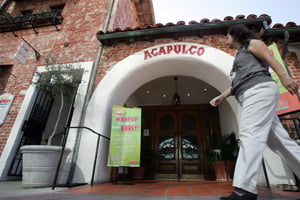
The L.A. restaurant market may lose a little spice but could broaden its palate now that Mexican restaurant giant Real Mex has filed for bankruptcy.
Real Mex Restaurants Inc., the Cypress parent of nearly 200 Chevys Fresh Mex, Acapulco and El Torito Mexican restaurants, filed for Chapter 11 bankruptcy earlier this month. Its private equity owners had struggled with debt payments, rising food costs and slumping sales during the recession.
The nation’s largest operator of full-service casual-dining Mexican restaurants, Real Mex has roughly 30 locations in Los Angeles County. Options include closing less profitable locations, selling off or liquidating one or more brands, and selling restaurants to franchisees. Whatever actions it takes, any L.A. locations left vacant are likely to be snapped up quickly.
“About 1,700 restaurants open in Los Angeles County each year so it’s really fertile ground here,” said John Self, who teaches restaurant management at Cal Poly Pomona’s Collins College of Hospitality Management. “That being said, you still have to water and fertilize regularly. And if Real Mex can’t, there are plenty of people willing to give it a try.”
While its corporate headquarters are just over the border in Orange County, Real Mex has deep roots in Los Angeles. The first El Torito, which emphasizes traditional Mexican food, opened in Encino in 1954. Acapulco, which features more coastal Mexican cuisine, was founded in Pasadena in 1960. Chevys is a border cantina-style concept founded in the San Francisco Bay Area in 1986.
Between 1996 and 2005, the three were merged by new owners under the name Real Mex Foods, which was later acquired by an affiliate of Boca Raton, Fla. private equity firm Sun Capital Partners Inc.
Creative slump
Real Mex has been plagued with slumping sales since 2008. New management had been working to freshen up the tired eateries, including a rebranding initiative for Chevys and menu revamps and promotions at El Torito and Acapulco locations in Southern California. But it couldn’t keep up.
“During the recession, fast-casual chains like Chipotle took off because they were offering higher quality food than a McDonald’s at lower price than a full-service casual chain,” said analyst Nick Setyan at Wedbush Securities Inc. in Los Angeles. “On top of that, Real Mex wasn’t competing as effectively as Olive Garden’s owners were in keeping its name out there. When was the last time you saw a TV ad for El Torito in Los Angeles?”
If Real Mex decides to scale back its presence in Los Angeles, a wide variety of mom-and-pop or small chain restaurant concepts would likely take its place, said Stephanie Skrbin, a retail broker at Lee & Associates.
“There are so few spaces and so much demand,” she said. “An out-of-date restaurant isn’t missed in Los Angeles.”
As an example, Skrbin noted that when the lease expired at an aging Sizzler in Santa Monica last year, the property owner gutted the building and split it in half so that a Veggie Grill and a Poquito Mas, two growing regional fast-casual chains, could share the space.
Veggie Grill co-founder Kevin Boylan said he and his partner had been looking to expand into a Santa Monica location for three years before the old Sizzler property opened up. He doesn’t rule out the possibility of doing a similar deal in the future if he finds a vacant Real Mex property.
“The owner of the Sizzler building told us he was looking for something fresh but solid,” Boylan said. “It’s been a great partnership. Customers come to one restaurant one day and the other the next.”
Possible reorganization?
Real Mex, which according to its bankruptcy filing had assets of $272 million and debt totaling about $250 million as of June 26, could still decide to remain a player on the L.A. restaurant scene. There are recent precedents.
The Memphis parent of Marie Callender’s restaurants filed for Chapter 11 in June and has closed some restaurants, including two in the Los Angeles area, but still operates other local outlets. And Santa Monica’s Fatburger Corp. sold restaurants to franchisees following the bankruptcy of two subsidiaries in 2009.
Still, if it wants to stay in business, Real Mex will have some work to do. The three restaurant chains were widely perceived by the public as being very similar and often in competition with each other. In Burbank alone, Real Mex had a Chevys and El Torito.
“When it comes to Mexican food, Californians – especially in Los Angeles – have very sophisticated palates, so if you are a corporate chain you have to have something extra to set yourself apart,” said Self at Cal Poly Pomona, a former fan of Acapulco and El Torito who hasn’t been in either restaurant in more than a year.
